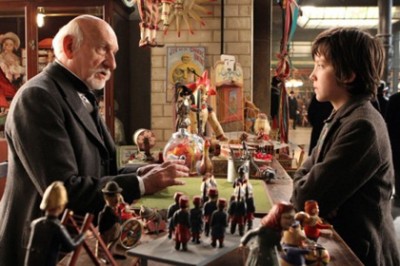Men and Machines
Martha Stallman
Martin Scorsese, “Hugo”
GK Films
2011, 126 minutes
 One of my favorite Kurt Vonnegut quotes: “As for the charms of physics: Two of the most entertaining subjects taught in high school or college are mechanics and optics.”
One of my favorite Kurt Vonnegut quotes: “As for the charms of physics: Two of the most entertaining subjects taught in high school or college are mechanics and optics.”
(It’s not one of his flashier quotes, I’ll admit, but it’s dead-on if you don’t count wood shop.)
We tend to think of magic—if we think of it at all—as a throwback, something properly relegated to Long Ago and Far Away. Magic is something like a proto-science, mankind’s first clumsy, naïve attempt to master the unseen forces at work in the world. As such, it has all the mildly embarrassing charm of a prom portrait: the JNCO knockoffs, the chain wallet, the ill-considered lace front, the lime green anything. “Lead into gold? Really? Good lord, what was I thinking?!”
Science and technology (a phrase invariably spoken, in my head, by Carl Sagan) have supplanted magic as the primary mode of material engagement for all but the most hopeful and least mathematically-inclined, but there are a few odd places in our collective imagination where science and magic seem, again and again, to come together, not in battle but in the sort of shy mutual appreciation of two great artists meeting for the first time. Mechanics is one of those places; another is optics.
Many real movie reviewers—people who know what they’re talking about—have called “Hugo” a love letter to movies, Martin Scorsese’s earnest celebration of the very particular optical illusion known as cinema. Those critics are correct but incomplete; they have missed, at the letter’s margin, the X’s and O’s scratched out for mechanical wonders, most especially those icons that power so many tales of modern magic: clocks and trains.
For Hugo, an orphaned watchmaker’s son hiding in the vast clockworks of a Parisian train station, these perpetually moving machines offer the only stability to be had. The station’s lonely crawlspaces are a home that, for all its lack of family, is more humane than the few actual humans who notice Hugo’s existence. One of these humans is Georges Méliès, a reluctant toymaker, forgotten filmmaker, and wounded magician, who owns a shop in the train station.
Méliès provides an unlikely but crucial bit of human contact for a boy like Hugo who has been nearly swallowed by the industrial age. At one point, Hugo says, “I’d imagine the whole world was one big machine.” After seeing the movie, it’s easy to imagine Scorsese himself saying the same thing: each setting is laid out with the mechanical precision of an architect’s site plan. The train station in particular is a lovely example of mechanics-as-place; its very function—scheduled travel—fits the trains and clocks, great machines themselves, together in the reciprocal dependence of a pair of gears. Hugo, as part of this mechanical world, is able to feel a sense of purpose and belonging that is all the more poignant for the fact that it comes from lifeless metal and steam. As he says, “if the entire world was one big machine, I couldn’t be an extra part. I had to be here for some reason.”
Méliès is that reason. Initially at odds, Hugo and Méliès become, by movie’s end, a family whose broken hearts are mechanistically mended; a science of enchantment allows each to see a representation of his fondest dreams, an optical illusion with the weight of truth. For Hugo, it’s the picture drawn by an automaton that stands as his last tactile link to the father who loved him. For Méliès, it’s the flickering image, from a portable movie projector, of the work he loved. His own lost magic.

Martha Stallman, Staff Blogger.

0 comments on “Review: Stallman”